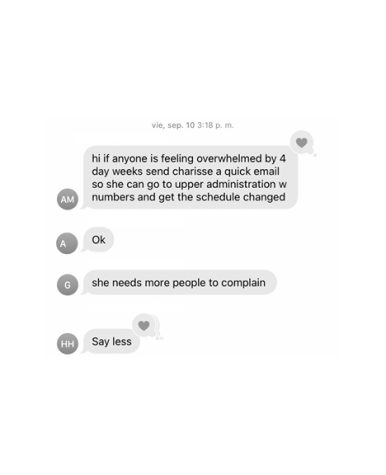Opinion: Stop complaining about school, you signed up for this
During the fall trimester, I heard students complaining about their workloads more than I ever had in my three years at Urban. Understandably, the transition back to fully in-person school was challenging for everyone. During Zoom and hybrid school, it was clear that the same level of pre-pandemic rigor was impossible to achieve in a virtual format. This being the case, Urban teachers assigned students far less work due to the significantly reduced class time and general productivity. They also took into account the emotional hardships faced by students constantly being at home and the often depressing state of the world. Since our return to in-person school, the workload has increased. We have also returned to Urban’s old schedule and spend more than six hours on campus every day.
After returning to in-person school, students seemed more vocal about their struggles with their workloads. Some then took their complaints to their grade deans seemingly without consideration for the changes faculty had already made to the curriculum, as well as the responsibility of teachers to challenge students in their learning. Urban is by all standards difficult. But when our tuition for the 2022-2023 school year is $55,647, shouldn’t students expect a certain level of stress and rigor and understand the value of the academic preparedness Urban offers for students’ futures?
In Urban’s Faulkner class, the curriculum was changed to remove a novella and other short stories for the sake of student wellbeing. Annotating the text, which is usually an important part of understanding a reading and demonstrating completed work, was also made optional. In English 1A, the course changed from reading two novels to one. Spanish 4A began by returning to core language skills. Fall term’s History of South Asia only had two major essays, another significant decrease in a curriculum’s workload.
English teacher Courtney Rein has taught at Urban prior to and during the pandemic. “I think what’s great about Urban is the challenges that we ask of students have more to do with new understandings [and] new ways of seeing the world, taking risks, and learning in a way that doesn’t just rely on kind of predictable outcomes,” said Rein. In the same interview, Rein also noted the often overlooked value of deliberate stress creating resilience and a capacity for growth.
Urban has remained a difficult school, and many students found themselves out of practice in their work habits due to reduced workloads during the pandemic. Some changes to the curriculum make sense, and teachers made them, but students still found themselves without the tools to adequately voice and address their concerns with the renewed rigor. Grace Nesmith ‘22 said, “There was an energy [in school] to make up for all that lost learning. I think that added a new level of rigor that really didn’t take into consideration [the] unprecedented hardships of coming back to school after being online.”
While learning habits and workloads changed after being out of school for so long, these changes can also be a reminder that Urban is as difficult and as rewarding as you make it. Julia Susser ‘22 changed the way she worked during the pandemic because she found she had so much more free time to focus on what brought her joy. “I also understand when to balance [my work] and how hard [I] should work for it. Maybe don’t [always] be that perfect, perfectionist student, [and] instead take that time to do other things,” she said.
It took the pandemic and stay-at-home order for Susser to learn to find a balance between school and leisure. This makes sense given that ultimately, Urban is an institution predicated on college prep. Because of this attitude towards higher learning and future success, students’ ideas of success are limited to grade-centric metrics of doing well, and many of us are not used to external forces such as a pandemic impeding our ability to succeed. Instead of facing new challenges with the goal of overcoming them, students have turned to frustration and complaints as if they have been cheated out of the learning experience to which they think they are entitled .
.
Without negating the valid concerns of student stress and burnout, it is also important to keep in mind our choice in coming to this school and how we approach our own learning. Even if students don’t necessarily recognize it, teachers have taken into account the wellbeing of students as they have altered curriculums for this school year. It is also important to remember the role we have in approaching our own learning. “I want to remind all of us that what we put our attention on is the choice and that the most powerful thing we can do is be deliberate about what we’re paying attention to,” said Rein.

